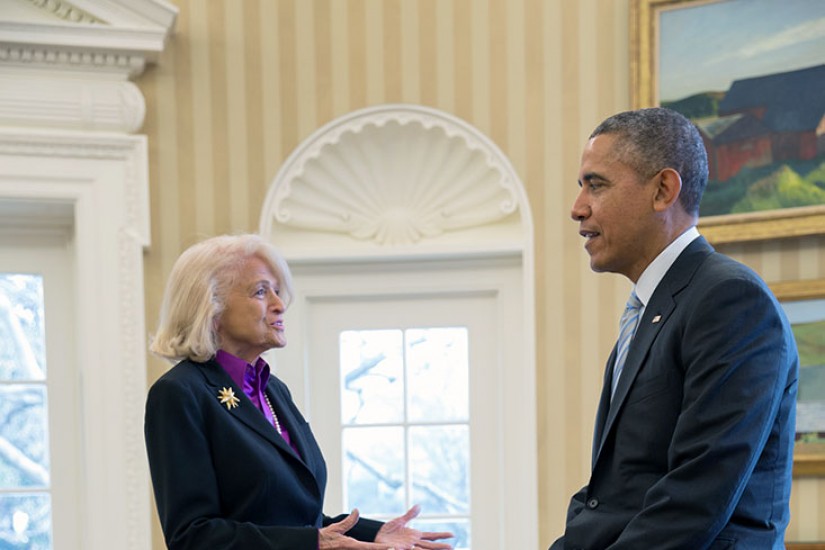"Fuck the Supreme Court!” Edith Windsor said, one hideously hot morning in June, when she’d had just about enough. Then she sighed and mumbled, “Oh, I don’t mean that.” What she really meant was that she was hot, she was tired of waiting, and, most of all, she was tired of being told what to do. “I’m feeling very manhandled!” she said.
It was Windsor’s eighty-fourth birthday, and she was spending it staring at a laptop screen as information from scotusblog.com flashed by in a typeface too small for her to read comfortably. Four years earlier, Windsor’s partner of more than forty years, Thea Spyer, died, leaving Windsor her sole heir. The two were legally married in Canada, in 2007, but, because of the Defense of Marriage Act, Windsor was not eligible for the exemption on estate tax that applies to husbands and wives. She had to pay $363,053 in taxes to the federal government, and $275,528 to New York State, and she did not think that was fair. So, with the help of her attorney, Roberta Kaplan, Windsor sued the United States. “When I saw it in print on the brief—Edith Windsor v. the United States of America—for a moment I panicked,” she said. “Then I thought, If Robbie’s not terrified, I’m not terrified.” But the waiting was getting to her. Once, when Spyer was alive, Windsor attended a meeting with the head of the Human Rights Coalition, at which someone asked him about gay marriage. He replied that it was something that ought to be dealt with later. Windsor stood up and barked, “I’m seventy-seven years old, and I can’t wait!”
Windsor first sought representation for her suit in 2009; she approached a number of gay-rights organizations. “I was told it was the wrong time for the movement,” she said. So a friend of a friend introduced her to Roberta Kaplan, who had been co-counsel on the (unsuccessful) case for marriage equality in New York State in 2006 but usually works at the furthest extreme from gay-rights non-profits. As a partner at the corporate law firm Paul, Weiss, Rifkind, Wharton & Garrison, she has numbered among her clients J. P. Morgan Chase and Fitch Ratings. Kaplan is a vigorous, highly assertive forty-seven-year-old, who wears a Rolex and drives an Audi. (Recently, she took her wife, Rachel Lavine, and their seven-year-old son, Jacob, to Yellowstone, on her way back from a conference in Montana. I asked if they had camped out. “Yes,” Kaplan said. “At the Four Seasons.”)
When she took on Windsor’s case, pro bono, she made some rules for her client. For example, Kaplan instructed Windsor not to talk publicly about sex—a subject on which Windsor is exceptionally colorful and voluble. “All I needed was Antonin Scalia reading about Edie and Thea’s butch-femme escapades,” Kaplan told me. And now, during this maddeningly humid week when the Court was expected to announce its ruling, Kaplan was requiring Windsor to come over every morning to the large apartment she shares with her family, so that, when the ruling was finally handed down, attorney and client would be together and ready to face the press and the public right away.
